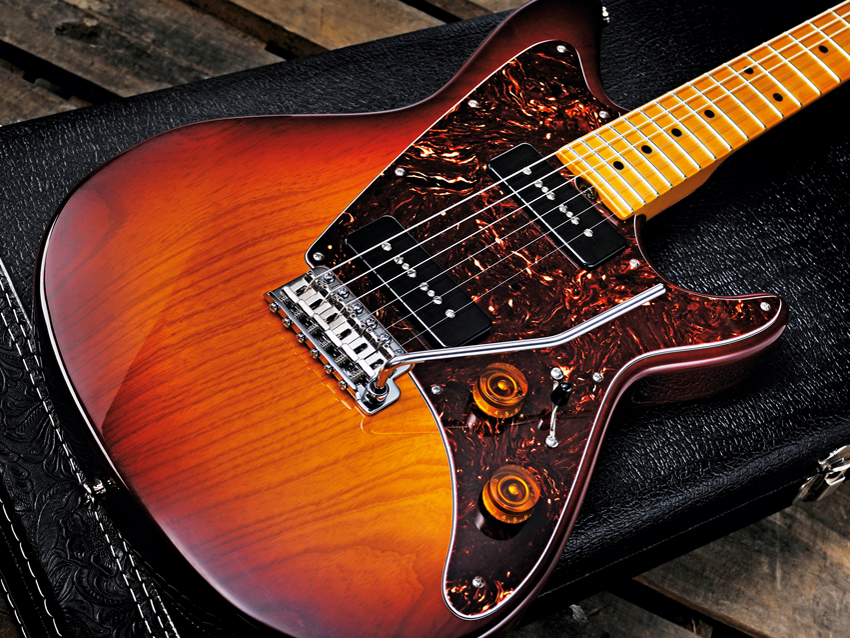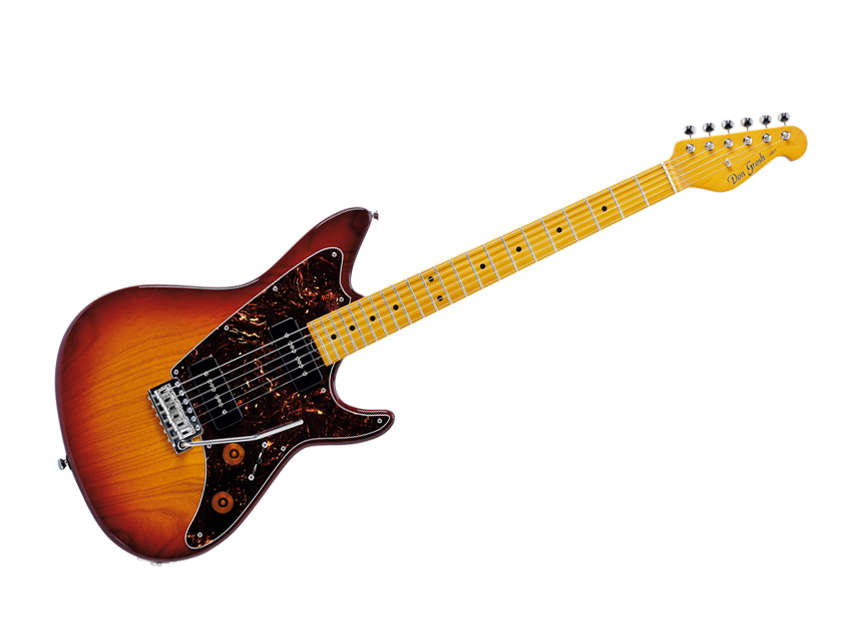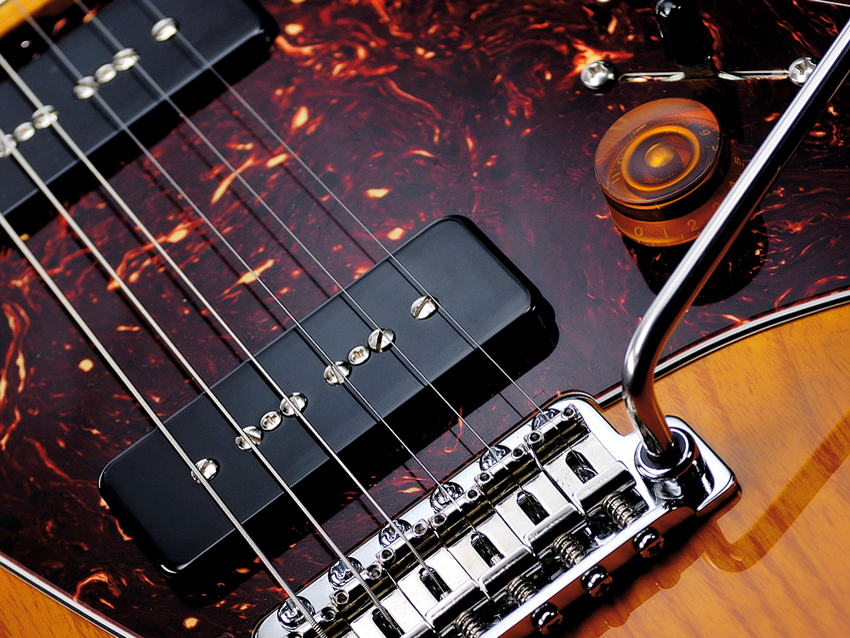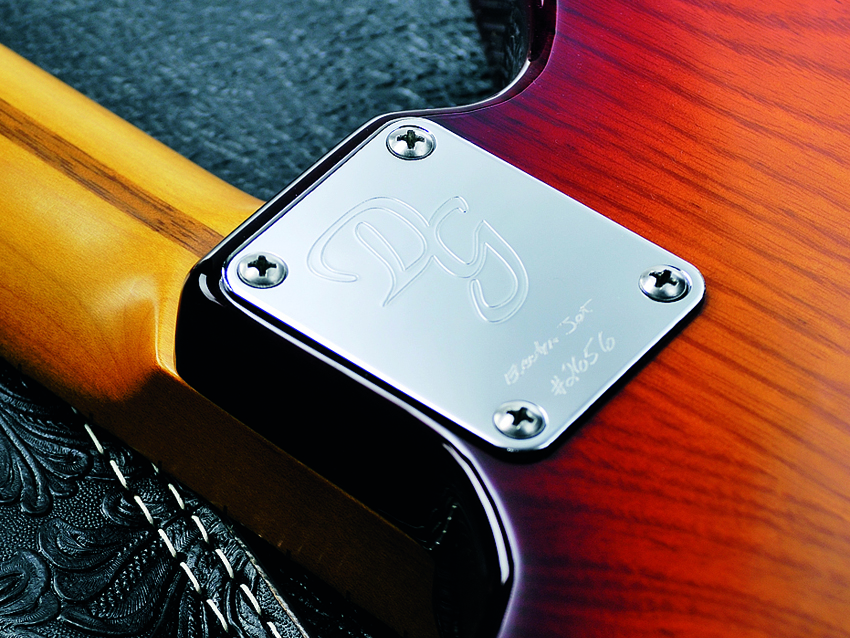MusicRadar Verdict
Far from a copy but infused with Fender flavour, the ElectraJet is superbly executed with great sounds, highly detailed build and loads of options. Join the queue…
Pros
- +
Superbly detailed build. Hybrid Fender-inspired design. Excellent sounds.
Cons
- -
Supplied set-up. Old-style truss rod adjuster.
MusicRadar's got your back

Grosh ElectraJet

Grosh ElectraJet

Grosh ElectraJet

Grosh ElectraJet
Don Grosh has been building guitars since 1985, first for Valley Arts and then, since 1993, for his own brand. He relocated his California base to Broomfield, Colorado in 2005, where the company now employs six people and builds around 20 guitars a month.
"Don spends 95 per cent of his time in the shop," says Grosh's Brent Johnson. "He still hand-selects and tone taps every piece of wood, hand fits every neck to every body, paints and polishes every guitar and manages all other aspects. And he personally checks every guitar before it goes out."
"The 'board edges are nicely rounded so that it feels like your favourite old Fender. It looks like one, too."
Stylistically, the 'Jet's swamp ash body certainly reflects the Jazzmaster, Tele and Strat into a highly attractive new but familiar design. The Fender vibe continues with the one- piece 'aged satin' bolt-on maple neck/fingerboard and its conventional four-screw joint.
The detail is fantastic, with a great neck shape - a full-bodied 'C' (22mm deep at the first fret, 24.7mm at the 12th) - and flatter-than-vintage radiused face with immaculately installed frets. The 'board edges are nicely rounded so that it feels like your favourite old Fender.
It looks like one, too. To that end we have the old style truss rod adjustment at the base of the neck, which means quick adjustments aren't easy - as we found due to an over-low supplied set-up.
The hardware reflects the quality of the build: vintage-looking Gotoh locking tuners and Gotoh vibrato, albeit with a drastically shaved block and strings that sit much closer to the top plate than an original Fender version.
The top plate and saddles are steel and the arm pushes into its collared socket, you then wind it down onto an internal screw thread and can adjust swing tension.
Want all the hottest music and gear news, reviews, deals, features and more, direct to your inbox? Sign up here.
Adding dual soapbars to a Fender platform is hardly unique and here the in-house made, Alnico V-powered Grosh G-90s mount directly to the body. The three-way lever, master volume and tone are placed on the over-sized tortie scratchplate, while the output jack is Tele positioned on the body's edge on a solid metal football plate.
Sounds
Not surprisingly, the ElectraJet has a Fendery snap and a nice smooth sustain. The overall feel is played in - like a well-gigged guitar rather than a new one - it's subtle but noticeable.
There's a strong classic output from both pickups - the middle position, both-on, is hum- cancelling - and it sounds like someone's boosted the lower mids compared to a new Fender Telecaster. Consequently, the bridge pickup still has some bark and bite, but sounds smoother and thicker, although it is still more Fender than Gibson-like. The mix, too, is thicker and fuller while the neck pickup sounds more hot-Strat-like, but again fuller.
The volume control (with a treble bleed cap) feels a little stiff, but cleans up nicely when reduced, and as we get used to the guitar its versatility becomes very apparent. It's really sweet sounding on clean reverb'd tones, and quite jazzy with it, but to our ears it finds its sweet spot on those on-the- edge-of-crunch sounds that seem to inform pretty much every modern Nashville or Austin record, and a lot more besides.
Gain-boosted lead lines are thick but not gluey with that lovely single-coil high-end that's never sharp or scratchy. Quite a drive!
Superbly made, this Grosh ElectraJet seems aimed at the more experienced player who's probably owned quality Fenders and Gibsons in the past.
P-90-style single-coils still remain niche, and seem more popular Stateside than they are here, but anyone who wants to explore the middle ground between the classic Gibson humbucker girth, and the sparkle and spank of a Fender, will find it here in spades.
Guitars such as this aren't about value - there are plenty of those out there. These guitars are about you, the player, finding your voice - and if that's Fender-based, with the added thickness of P-90s and a superb boutique 'old-style' build, then we highly recommend you check this one out. It might just be the sound you've been imagining.
Dave Burrluck is one of the world’s most experienced guitar journalists, who started writing back in the '80s for International Musician and Recording World, co-founded The Guitar Magazine and has been the Gear Reviews Editor of Guitarist magazine for the past two decades. Along the way, Dave has been the sole author of The PRS Guitar Book and The Player's Guide to Guitar Maintenance as well as contributing to numerous other books on the electric guitar. Dave is an active gigging and recording musician and still finds time to make, repair and mod guitars, not least for Guitarist’s The Mod Squad.
